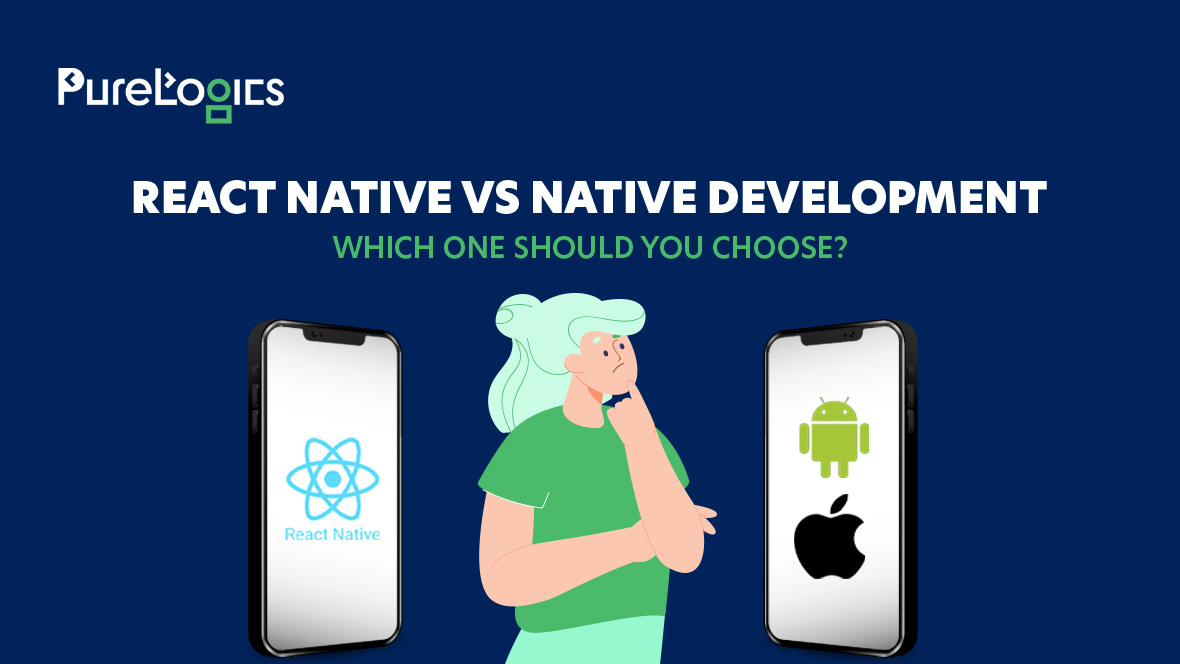What’s the best way to create an app? Let’s get started with a detailed comparison of Native vs hybrid App Development. Should you go with a native development approach, using tools and code specifically for the platform you’re targeting? Or is hybrid development the better option, using web technologies that will work on any device?
The answer is…it’s complicated. Each approach has its own advantages and disadvantages, so making the right decision depends on your specific needs.
In this write-up, we’ll outline the major pros and cons of both approaches to help you decide which one is best for your mobile app development efforts.
Native Vs Hybrid App Development
What is native mobile app development?
A native app is a type of mobile application that is developed specifically for a particular operating system, such as iOS or Android.
Native apps are usually written in the programming language that is associated with the platform, such as Objective C for iOS or Java for Android. They are then compiled into a form that can be run on the target platform.
Because native mobile apps are designed specifically for a platform, that means an iOS app cannot run on Android, and an Android app cannot run on iOS.
Keeping this in mind, you would be required to build two separate apps if you’re to appeal to both audiences. However, creating two versions of the app will increase development cost and time not only during the initial build but for the ongoing maintenance as well.
The pros and cons of adopting a native approach
Pros
- Speed and performance: Native apps are often faster and more responsive than their hybrid counterparts. Because they are built specifically for the platform they’re running on. This means that they can take advantage of all of the device’s features and optimizations. Which, in turn, will result in a smooth, seamless user experience.
- User experience: Because native apps are specifically designed for one platform, they provide a more seamless, user-friendly experience that is consistent across all devices.
- Feature richness: Native apps have access to all of the device’s features and APIs, which allows for a greater level of functionality and customization. This means that native apps can do things that hybrid apps can’t, such as use the device’s camera, microphone, or contacts list.
Cons
- Higher development costs: Native apps require separate development for each mobile platform. This increases cost and time to market as the development cycle will be slower.
- Maintenance: Once your app is released, you’ll need to continue to invest time and resources into maintaining it and ensuring it remains compatible with new versions of the relevant operating systems.
- Limited reach: Native apps can only be installed on devices that run the same operating system as the app. So, an iOS app can only be installed on an iPhone or iPad, and an Android app can only be installed on a smartphone or tablet running Android.
What is hybrid mobile app development?
At its most basic, hybrid app development is the process of creating a single app that can be used on multiple platforms.
Basically, hybrid app development is a hybrid of native and web-based app development. Native apps are developed specifically for one platform, such as iOS or Android. Web-based apps are developed using web technologies such as HTML, CSS, and JavaScript, and they can be accessed through a web browser. Hybrid app development combines the best of both worlds.
It allows developers to create an app that can be used on multiple platforms while still taking advantage of the native features of each individual platform.
This makes hybrid apps much more versatile than either native or web-based apps, and it’s why they’re becoming increasingly popular.
The pros and cons of adopting a hybrid approach
Pros
- Cost-effective: Hybrid apps are less expensive to develop than native apps because they only need to be built once for both iOS and Android devices.
- Time-saving: Hybrid apps can be developed faster than native apps because they don’t require separate codebases for each platform.
- Easy to maintain: With a hybrid app, you only have to maintain one codebase, which makes updates and bug fixes much simpler.
- Increased reach: Hybrid apps have the potential to reach a wider audience than native apps because they can be published on multiple app stores.
- Better performance: Hybrid apps often have better performance than web apps because they take advantage of the native capabilities of mobile devices.
Cons
- Limited Functionality: Hybrid apps can often be more limited in terms of functionality than native apps. This is because they rely on web technologies, which are not always as robust as native app frameworks.
- Poor User Experience: Hybrid apps can also suffer from the poor user experience. This is because they often don’t feel as smooth and responsive as native apps. This can be a major problem for users who are accustomed to the high-quality experiences offered by native apps.
- Fragmentation Issue: Hybrid apps can also be more susceptible to fragmentation issues than native apps. This is because different devices and operating systems often have different levels of support for web technologies, which can lead to inconsistency across devices.
- Limited Platform Support: Hybrid app development is usually only possible on a limited number of platforms. This is because many platforms (such as Windows Phone) do not support the web technologies that are required for hybrid app development.
Concluding remarks on Native Vs Hybrid App development:
Native apps are generally faster and more reliable because they have been specifically designed for one platform. However, hybrid apps can be developed more quickly and cheaply, making them a good option for businesses on a budget.
So, what’s the best option for your business? It depends on your specific needs and budget. If you need a high-quality app that looks great and performs well, go with native development.
But if you want an app quickly and don’t mind sacrificing some performance or design quality, hybrid development is a good option.
Still, having trouble making a decision? Let us know your intended app and what you plan to build. Our experts would be happy to offer you advice and put you in touch with the best development team. Who will carry out your idea based on the strategy that best suits your needs.


 [tta_listen_btn]
[tta_listen_btn]
 August 23 2022
August 23 2022






